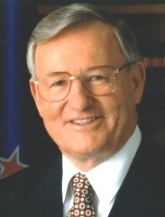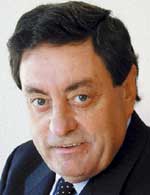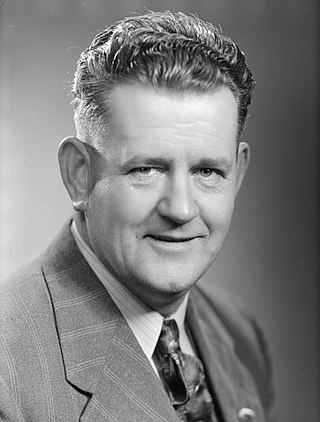Related Research Articles

Michael Kenneth Moore was a New Zealand politician, union organiser, and author. In the Fourth Labour Government he served in several portfolios including minister of foreign affairs, and was the 34th prime minister of New Zealand for 59 days before the 1990 general election elected a new parliament. Following Labour's defeat in that election, Moore served as Leader of the Opposition until the 1993 election, after which Helen Clark successfully challenged him for the Labour Party leadership.

James Patrick Anderton was a New Zealand politician who led a succession of left-wing parties after leaving the Labour Party in 1989.

Christopher Joseph Carter is a former New Zealand Labour Party and independent Member of the New Zealand Parliament. He was a senior Cabinet Minister in the Fifth Labour Government of New Zealand, serving lastly as Minister of Education, Minister Responsible for the Education Review Office and Minister of Ethnic Affairs. He was the Member of Parliament for the Te Atatu electorate, where he was first elected in 1993. He did not win re-election in 1996, but won a new and expanded Te Atatu seat in 1999. In 2010, he was suspended from the Labour Party caucus following a dispute with party leader Phil Goff, shortly afterwards he became an independent MP. He was expelled by the Labour Party for breaching the Party's constitution in bringing the Party in disrepute, on 11 October 2010. In September 2011 Carter resigned from Parliament following his appointment to a United Nations position in Afghanistan where he served for 4 years. In 2015 he was appointed to head UN operations in Rakhine State in Myanmar where he served for 3 years. In 2018 he rejoined the New Zealand Labour Party and stood for election as a Labour Party representative in the 2019 New Zealand local elections. Carter was elected and appointed as Chairperson of the Henderson Massey Local Board with 11,250 votes. He also won election in 2019 as one of the seven elected board members of the Waitemata District Health Board with 14,593 votes. Both positions have three year terms.

Jonathan Lucas Hunt is a New Zealand politician, and was New Zealand's High Commissioner to the United Kingdom from 2005 to March 2008. He formerly served as Speaker of the New Zealand House of Representatives. He is a member of the Labour Party, and was until his retirement in 2005 the longest-serving MP in Parliament. Hunt is a member of the Order of New Zealand, New Zealand's highest civilian honour. Hunt was given the nickname the "Minister for Wine and Cheese" after his well-known liking of the combo.

Richard William Prebble is a former member of the New Zealand Parliament. Initially a member of the Labour Party, he joined the newly formed ACT New Zealand party under Roger Douglas in 1996, becoming its leader from 1996 to 2004.

The 1990 New Zealand general election was held on 27 October to determine the composition of the 43rd New Zealand parliament. The governing Labour Party was defeated, ending its two terms in office. The National Party, led by Jim Bolger, won a landslide victory and formed the new government.

The 1993 New Zealand general election was held on 6 November 1993 to determine the composition of the 44th New Zealand Parliament. Voters elected 99 members to the House of Representatives, up from 97 members at the 1990 election. The election was held concurrently with an electoral reform referendum to replace the first-past-the-post system, with all members elected from single-member electorates, with mixed-member proportional representation. It saw the governing National Party, led by Jim Bolger, win a second term in office, despite a major swing away from National in both seats and votes, and the carrying of the referendum by 53.9% to 46.1%.
Clive Denby Matthewson is a New Zealand civil engineer and former politician.

George Warren Hawkins is a New Zealand politician. He has served in local government, including as mayor of Papakura from 1983 to 1992, and in New Zealand parliament as a member for the Labour Party between 1990 and 2011.

Graham Desmond Kelly is a former New Zealand politician.

Judith Mary Keall is a former New Zealand politician. She was an MP from 1984 to 1990, and again from 1993 until her retirement in 2002, representing the Labour Party.

The 45th New Zealand Parliament was a term of the Parliament of New Zealand. Its composition was determined by the 1996 election, and it sat until the 1999 election.

David Francis Caygill is a former New Zealand politician. Caygill was born and raised in Christchurch. He entered politics in 1971 as Christchurch's youngest city councillor at the age of 22. He served as a Member of Parliament (MP) from 1978 to 1996, representing the Labour Party. A supporter of Rogernomics, he served as Minister of Finance between 1988 and 1990. From 2010 to 2019, he was one of the government-appointed commissioners at Environment Canterbury.

Richard John Northey is a New Zealand politician. He was an MP from 1984 to 1990, and again from 1993 to 1996. He served on the Auckland Council between 2010 and 2013, and is a member of the Labour Party.

Koro Tainui Wētere was a New Zealand politician. He was an MP from 1969 to 1996, representing the Labour Party. He served as Minister of Māori Affairs in the Fourth Labour Government (1984–1990).

Hugh Watt was a New Zealand politician who was a Labour member of Parliament and the acting prime minister of New Zealand between 31 August and 6 September 1974, following the death of Prime Minister Norman Kirk. He had been the fifth deputy prime minister of New Zealand since 8 December 1972. Watt later served as high commissioner to the United Kingdom.
Frederick Miroslav Gerbic was a New Zealand politician of the Labour Party.
Frank Lewis Rogers was a New Zealand politician of the Labour Party.

Warren Wilfred Freer was a New Zealand politician and member of the Labour Party. He represented the Mount Albert electorate from 1947 to 1981. He is internationally known as the first Western politician ever to visit the People's Republic of China.

The Mangere by-election of 1977 was a by-election for the electorate of Mangere on 26 March 1977 during the 38th New Zealand Parliament. The by-election resulted from the resignation of the previous member Colin Moyle after accusations against him in parliament, and he was replaced by David Lange, also of the Labour Party. Apart from Lange, there were seven other candidates in the by-election.
References
- Who's Who in the New Zealand Parliament 1996. Wellington: Parliamentary Service. 1996.